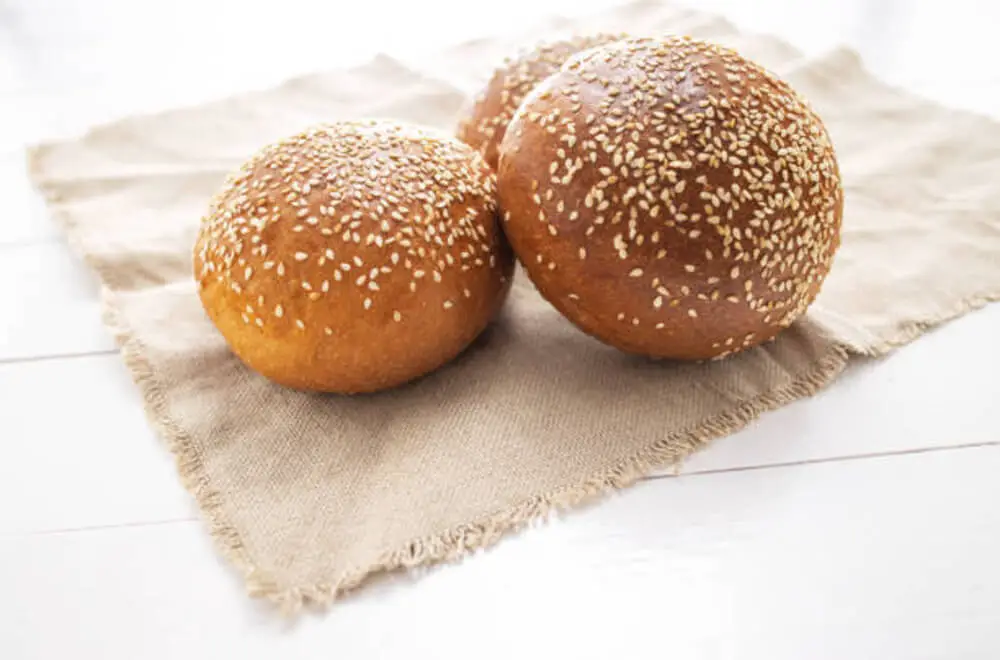
Sourdough Burger Buns Recipe
Delightfully tender and fluffy, these easy sourdough burger buns are crafted with 100% natural yeast, making them perfect for your summer BBQ. They offer the ideal balance of sturdiness and softness, ensuring they hold up well whether toasted or eaten plain. Enjoy them with your next meal and experience the deliciousness today!
Print
Pin
Servings: 8 Buns
Ingredients
Levain (overnight, 10-12 hours at 78ºF)
- 10 grams ripe/active sourdough starter
- 100 grams all-purpose flour
- 100 grams water
Easy Sourdough Burger Buns
- 200 grams levain
- 240 grams buttermilk see recipe notes
- 1 large egg about 50 grams
- 42 grams sugar
- 515 grams bread flour
- 11 grams salt
- 57 grams unsalted butter softened (about 4 tablespoons)
Toppings
- 1 large egg for egg wash
- A splash of water for egg wash
- Sesame seeds or everything but the bagel seasoning to top
Instructions
Levain (overnight/12 hours at 78 degrees F)
- Combine 10 grams of active sourdough starter with 100 grams of flour and 100 grams of water. Cover and let it rest overnight, approximately 12 hours, until it is bubbly, doubled in size, and has reached its peak.
Easy Sourdough Burger Buns
- In the bowl of a stand mixer, combine levain, buttermilk, egg, sugar, most of the bread flour, and salt. Mix thoroughly until everything is well incorporated, then gradually add the remaining flour until the dough is tacky (not overly sticky) and pulls away from the bowl's sides. Knead for 3-5 minutes until smooth.
- Divide the softened butter into 4 pieces, adding them one at a time into the dough's center as it mixes. Continue kneading for an additional 5 minutes until the butter is fully absorbed, and the dough is smooth and glossy.
- Place the dough in a container and set it in a warm spot for 4-5 hours. The dough temperature should be 78 degrees F during this bulk fermentation. If your dough is cooler than 78 degrees F, extend the bulk fermentation time. If it is warmer, the fermentation time will be shorter.
- By the end of the bulk fermentation, the dough should have puffed up slightly (about 20%-30%) and feel smooth and airy. If it hasn't, allow it to sit longer. At this stage, you can refrigerate the dough overnight or for up to 48 hours. If opting for a cold ferment, additional rise time may be required after shaping.
- Transfer the dough to a countertop and divide it into 8 equal pieces, roughly 130 grams each. Shape each piece into a ball by pulling and pinching up the sides, then roll the ball on the counter using a cupping motion to seal and create tension for rising.
- Line a large baking sheet with parchment paper and place the dough balls on the sheet, spaced apart. Cover and let the buns rise for 2-3 hours in a warm environment (78-80 degrees F), such as an oven with the light on.
- The buns are ready when they are puffed up and feel light and airy. The dough should not be hard or stiff; when gently pressed, it should leave a small indentation that springs back slightly. If the dough feels firm or springs back completely, allow more time to rise.
- Preheat the oven to 400 degrees F (remove the buns if they were rising in the oven). Place a baking stone on the oven's bottom rack to prevent the buns' bottoms from burning.
- Mix the egg with a splash of water and brush it over the buns if desired. Sprinkle with sesame seeds or "everything but the bagel" seasoning.
- Place a handful of ice cubes in a baking pan and position it on the oven's bottom rack, immediately placing the pan of burger buns on the rack above the ice cubes. Bake for 18-20 minutes until light brown and fully baked. Allow the buns to cool completely before toasting or using them for burgers. Enjoy!
Notes
Buttermilk: I've tested this recipe with both 2% milk and buttermilk. Using buttermilk results in buns that are more tender and flavorful, but they are still delicious with regular milk. If you don't have buttermilk available, milk will work just fine as a substitute.